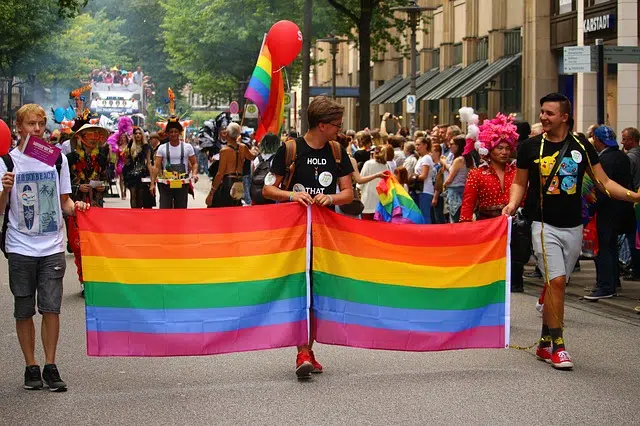
The rejection or hatred of homosexual people is called homophobia.
Homophobia is the term that has been used to describe the rejection, fear, repudiation, prejudice or discrimination towards women or men who recognize themselves as homosexual . In any case, the daily use of the word includes other people included in sexual diversity , such as bisexuals and transsexuals . Even those beings who maintain habits or attitudes that are usually attributed to the opposite sex, such as metrosexuals .
It should be noted that homophobia lacks a precise definition, since it is not a concept of strictly psychiatric scope . There are those who consider anyone who does not support or speak out in favor of homosexuality to be homophobic. However, the notion refers to discrimination , that is, rejection or persecution.
Various statistics indicate that, around the world, every two days a gay person is the victim of a crime framed in acts of homophobia. According to Amnesty International , more than seventy countries persecute homosexuals and eight even sentence them to death.
Origin of the concept
The word homophobia was first used by American psychologist George Weinberg in 1971 . Years ago, Wainwright Churchill had referred to homoerotophobia .
Another related concept is heterosexism or heterocentrism , which gives a name to the belief that heterosexuals are, by nature, superior organisms in relation to homo and bisexual people.
Many religions maintain a moral position of rejection of homosexuality , which is why they can be considered homophobic. Christian, Jewish and Islamic orthodoxy, for example, do not accept homosexuality as a natural sexual condition of a person, but rather consider it an anomaly. Therefore, homosexuality appears as a sin .

Due to the homophobia of many individuals, same-sex couples often suffer attacks and discrimination.
Why is homophobia not a phobia?
It is necessary to point out that homophobia is not exactly a phobia , due to the characteristics that differentiate it. While in a phobia the emotion that motivates it is fear, homophobia is motivated by hatred , which manifests itself in a moderate way (through bodily sensations of repulsion, such as psychological discomfort in front of homosexual people) or severe (through psychomotor alteration that leads an individual to verbally or physically insult another homosexual, in some cases they can even kill because of it).
Furthermore, a characteristic of phobias is that the reaction of individuals who suffer from them is to flee from what causes them fear, thus, someone who suffers from acrophobia tends not to put themselves in high situations to avoid said fear; On the contrary, homophobes seek encounters with homosexual people in order to prove to themselves that their position is correct. The way they do this is by denigrating, humiliating and destroying anyone who has the characteristics of a homosexual (not even It has to do with having confirmed his homosexuality, but with demonstrating an attitude that for the homophobe fits within the description of a homosexual).
Phobes tend to hide their disorder, they do not like to talk about it even if they know they may need help, on the contrary, homophobes want to make their thoughts public , they make it a necessary battle and try to join those who think the same.
Finally, while people who suffer from phobias are fully aware of their disorder and can talk about it to understand it, homophobes do not think that there is a problem with them, rather that the problem lies with homosexuals. They seek to naturalize that brutal hatred that eats away at them and even reach such levels of incoherence that they are capable of stating: "I am not a homophobic person...the only thing that happens to me is that I cannot see two women (or men) together because that It's not natural."
The emergence of repudiation
One of the issues that lead someone to become homophobic is the suspicion that they themselves have homosexual potential, as explained by Dr. Miguel Urbina, who assures that the intensity of this repudiation of what comes from the outside world generates a some relief to those fears that come from the inner world.
Hegemony in current societies, both in the West and in some Eastern countries, is held by a model where the man is the one who sets the conditions in which life in society must develop. Women and everything related to the feminine are synonymous with weakness, and those men who cross the limit, abandoning their manhood in pursuit of greater sensitivity or diverse forms of expression than what is considered obligatory in their gender, are rejected and mistreated, considered inferior to the rest of their peers (studies affirm that this may be motivated by the feeling of inferiority. Deep down, sexists feel that homosexuals are superior to them because they are free from social structures, they would never admit it! !)
History of homophobia
Homophobia did not always exist , in ancient civilizations, such as the Romans, the Mayans, the Sumerians, the Chinese dynasty and the Greeks, sexual practices between people of the same sex were allowed and were even considered sacred. With the arrival of Christian morality , which had a great influence on the societies of the Middle Ages, homosexuality was considered sinful, a crime, and people who had sex with one of their peers began to be brutally persecuted . Some of the theologians who promoted this ideology of persecution of homosexuals were the still praised and deified Thomas Aquinas and Saint Augustine. From then on, an absolutely hermetic way of thinking was instilled with regard to sexual practices; homosexuality, masturbation, oral sex and all those practices that this institution, the church , considered as attacks against nature were condemned. From that moment on, homosexuality adopted the moralistic description of the sin of sodomy, which is defended even today by orthodox (and others who are not so) of the Christian religion.
Despite what many believe and try to make us think that the world is really changing, homophobia is part of all our societies. In the United States, thousands of adolescent boys take their lives because of the rejection they suffer at school from their peers just for showing an attitude considered unmanly; many others are beaten and tortured in horrific ways throughout the country. In the world, many adults who have expressed their homosexuality must also endure affronts of all kinds, even death in many cases (at the hands of homophobes or at their own hands due to the instability generated by psychological abuse). Terms like tomboy, faggot , etc., should disappear forever from our vocabulary because through these insults, often used jokingly, we feed homophobia.
In recent years, the coming out of the closet of people who proclaim themselves homosexual, in TV series or programs, could be collaborating with the dissemination of qualities such as tolerance and acceptance of others regardless of their sexual condition. At this point it is worth mentioning the work of the North American Ellen Degeneres , who has one of the most watched programs on television and who works tirelessly to completely change this reality.
Despite the work that is done, from these sectors that proclaim tolerance (which are not led solely by homosexuals, as is believed), today homosexuals (lesbians, gays, bisexuals and transsexuals) are victims of abuse by their sexual condition . In many countries they are still prohibited from marrying , which prevents them from exercising their rights as a consolidated couple, and in the same way, they are not allowed to adopt children. They are also discriminated against at work, and sexual relations between two people of the same gender are not approved either. For example, there are many complaints when a homosexual couple is simply kissing in a public place, which does not happen with heterosexual couples.
